Query an Array
On this page
You can query arrays in MongoDB using the following methods:
Your programming language's driver.
The MongoDB Atlas UI. To learn more, see Query an Array with MongoDB Atlas.
➤ Use the Select your language drop-down menu in the upper-right to set the language of the following examples or select MongoDB Compass.
This page provides examples of query operations on array fields using the
db.collection.find() method in mongosh.
The examples on this page use the inventory collection. Connect to a
test database in your MongoDB instance then create the inventory
collection:
This page provides examples of query operations on array fields using MongoDB Compass.
The examples on this page use the inventory collection. Connect to a
test database in your MongoDB instance then create the inventory
collection:
This page provides examples of query operations on array fields using the MongoCollection.Find() method in the MongoDB C# Driver.
The examples on this page use the inventory collection. Connect to a
test database in your MongoDB instance then create the inventory
collection:
This page provides examples of query operations on array fields using the Collection.Find function in the MongoDB Go Driver.
The examples on this page use the inventory collection. Connect to a
test database in your MongoDB instance then create the inventory
collection:
This page provides examples of query operations on array fields using the com.mongodb.reactivestreams.client.MongoCollection.find method in the MongoDB Java Reactive Streams Driver.
The examples on this page use the inventory collection. Connect to a
test database in your MongoDB instance then create the inventory
collection:
This page provides examples of query operations on array fields using the com.mongodb.client.MongoCollection.find method in the MongoDB Java Synchronous Driver.
Tip
The driver provides com.mongodb.client.model.Filters helper methods to facilitate the creation of filter documents. The examples on this page use these methods to create the filter documents.
The examples on this page use the inventory collection. Connect to a
test database in your MongoDB instance then create the inventory
collection:
This page provides examples of query operations on array fields using the
motor.motor_asyncio.AsyncIOMotorCollection.find
method in the Motor
driver.
The examples on this page use the inventory collection. Connect to a
test database in your MongoDB instance then create the inventory
collection:
This page provides examples of query operations on array fields using the Collection.find() method in the MongoDB Node.js Driver.
The examples on this page use the inventory collection. Connect to a
test database in your MongoDB instance then create the inventory
collection:
This page provides examples of query operations on array fields using the MongoDB::Collection::find() method in the MongoDB Perl Driver.
The examples on this page use the inventory collection. Connect to a
test database in your MongoDB instance then create the inventory
collection:
This page provides examples of query operations on array fields using the
MongoDB\\Collection::find()
method in the
MongoDB PHP Library.
The examples on this page use the inventory collection. Connect to a
test database in your MongoDB instance then create the inventory
collection:
This page provides examples of query operations on array fields using the
pymongo.collection.Collection.find method in the
PyMongo
Python driver.
The examples on this page use the inventory collection. Connect to a
test database in your MongoDB instance then create the inventory
collection:
This page provides examples of query operations on array fields using the Mongo::Collection#find() method in the MongoDB Ruby Driver.
The examples on this page use the inventory collection. Connect to a
test database in your MongoDB instance then create the inventory
collection:
This page provides examples of query operations on array fields using the collection.find() method in the MongoDB Scala Driver.
The examples on this page use the inventory collection. Connect to a
test database in your MongoDB instance then create the inventory
collection:
db.inventory.insertMany([ { item: "journal", qty: 25, tags: ["blank", "red"], dim_cm: [ 14, 21 ] }, { item: "notebook", qty: 50, tags: ["red", "blank"], dim_cm: [ 14, 21 ] }, { item: "paper", qty: 100, tags: ["red", "blank", "plain"], dim_cm: [ 14, 21 ] }, { item: "planner", qty: 75, tags: ["blank", "red"], dim_cm: [ 22.85, 30 ] }, { item: "postcard", qty: 45, tags: ["blue"], dim_cm: [ 10, 15.25 ] } ]);
[ { "item": "journal", "qty": 25, "tags": ["blank", "red"], "dim_cm": [ 14, 21 ] }, { "item": "notebook", "qty": 50, "tags": ["red", "blank"], "dim_cm": [ 14, 21 ] }, { "item": "paper", "qty": 100, "tags": ["red", "blank", "plain"], "dim_cm": [ 14, 21 ] }, { "item": "planner", "qty": 75, "tags": ["blank", "red"], "dim_cm": [ 22.85, 30 ] }, { "item": "postcard", "qty": 45, "tags": ["blue"], "dim_cm": [ 10, 15.25 ] } ]
For instructions on inserting documents in MongoDB Compass, see Insert Documents.
var documents = new[] { new BsonDocument { { "item", "journal" }, { "qty", 25 }, { "tags", new BsonArray { "blank", "red" } }, { "dim_cm", new BsonArray { 14, 21 } } }, new BsonDocument { { "item", "notebook" }, { "qty", 50 }, { "tags", new BsonArray { "red", "blank" } }, { "dim_cm", new BsonArray { 14, 21 } } }, new BsonDocument { { "item", "paper" }, { "qty", 100 }, { "tags", new BsonArray { "red", "blank", "plain" } }, { "dim_cm", new BsonArray { 14, 21 } } }, new BsonDocument { { "item", "planner" }, { "qty", 75 }, { "tags", new BsonArray { "blank", "red" } }, { "dim_cm", new BsonArray { 22.85, 30 } } }, new BsonDocument { { "item", "postcard" }, { "qty", 45 }, { "tags", new BsonArray { "blue" } }, { "dim_cm", new BsonArray { 10, 15.25 } } } }; collection.InsertMany(documents);
docs := []interface{}{ bson.D{ {"item", "journal"}, {"qty", 25}, {"tags", bson.A{"blank", "red"}}, {"dim_cm", bson.A{14, 21}}, }, bson.D{ {"item", "notebook"}, {"qty", 50}, {"tags", bson.A{"red", "blank"}}, {"dim_cm", bson.A{14, 21}}, }, bson.D{ {"item", "paper"}, {"qty", 100}, {"tags", bson.A{"red", "blank", "plain"}}, {"dim_cm", bson.A{14, 21}}, }, bson.D{ {"item", "planner"}, {"qty", 75}, {"tags", bson.A{"blank", "red"}}, {"dim_cm", bson.A{22.85, 30}}, }, bson.D{ {"item", "postcard"}, {"qty", 45}, {"tags", bson.A{"blue"}}, {"dim_cm", bson.A{10, 15.25}}, }, } result, err := coll.InsertMany(context.TODO(), docs)
Publisher<Success> insertManyPublisher = collection.insertMany(asList( Document.parse("{ item: 'journal', qty: 25, tags: ['blank', 'red'], dim_cm: [ 14, 21 ] }"), Document.parse("{ item: 'notebook', qty: 50, tags: ['red', 'blank'], dim_cm: [ 14, 21 ] }"), Document.parse("{ item: 'paper', qty: 100, tags: ['red', 'blank', 'plain'], dim_cm: [ 14, 21 ] }"), Document.parse("{ item: 'planner', qty: 75, tags: ['blank', 'red'], dim_cm: [ 22.85, 30 ] }"), Document.parse("{ item: 'postcard', qty: 45, tags: ['blue'], dim_cm: [ 10, 15.25 ] }") ));
collection.insertMany(asList( Document.parse("{ item: 'journal', qty: 25, tags: ['blank', 'red'], dim_cm: [ 14, 21 ] }"), Document.parse("{ item: 'notebook', qty: 50, tags: ['red', 'blank'], dim_cm: [ 14, 21 ] }"), Document.parse("{ item: 'paper', qty: 100, tags: ['red', 'blank', 'plain'], dim_cm: [ 14, 21 ] }"), Document.parse("{ item: 'planner', qty: 75, tags: ['blank', 'red'], dim_cm: [ 22.85, 30 ] }"), Document.parse("{ item: 'postcard', qty: 45, tags: ['blue'], dim_cm: [ 10, 15.25 ] }") ));
await db.inventory.insert_many( [ {"item": "journal", "qty": 25, "tags": ["blank", "red"], "dim_cm": [14, 21]}, {"item": "notebook", "qty": 50, "tags": ["red", "blank"], "dim_cm": [14, 21]}, { "item": "paper", "qty": 100, "tags": ["red", "blank", "plain"], "dim_cm": [14, 21], }, {"item": "planner", "qty": 75, "tags": ["blank", "red"], "dim_cm": [22.85, 30]}, {"item": "postcard", "qty": 45, "tags": ["blue"], "dim_cm": [10, 15.25]}, ] )
await db.collection('inventory').insertMany([ { item: 'journal', qty: 25, tags: ['blank', 'red'], dim_cm: [14, 21] }, { item: 'notebook', qty: 50, tags: ['red', 'blank'], dim_cm: [14, 21] }, { item: 'paper', qty: 100, tags: ['red', 'blank', 'plain'], dim_cm: [14, 21] }, { item: 'planner', qty: 75, tags: ['blank', 'red'], dim_cm: [22.85, 30] }, { item: 'postcard', qty: 45, tags: ['blue'], dim_cm: [10, 15.25] } ]);
$db->coll("inventory")->insert_many( [ { item => "journal", qty => 25, tags => [ "blank", "red" ], dim_cm => [ 14, 21 ] }, { item => "notebook", qty => 50, tags => [ "red", "blank" ], dim_cm => [ 14, 21 ] }, { item => "paper", qty => 100, tags => [ "red", "blank", "plain" ], dim_cm => [ 14, 21 ] }, { item => "planner", qty => 75, tags => [ "blank", "red" ], dim_cm => [ 22.85, 30 ] }, { item => "postcard", qty => 45, tags => ["blue"], dim_cm => [ 10, 15.25 ] } ] );
$insertManyResult = $db->inventory->insertMany([ [ 'item' => 'journal', 'qty' => 25, 'tags' => ['blank', 'red'], 'dim_cm' => [14, 21], ], [ 'item' => 'notebook', 'qty' => 50, 'tags' => ['red', 'blank'], 'dim_cm' => [14, 21], ], [ 'item' => 'paper', 'qty' => 100, 'tags' => ['red', 'blank', 'plain'], 'dim_cm' => [14, 21], ], [ 'item' => 'planner', 'qty' => 75, 'tags' => ['blank', 'red'], 'dim_cm' => [22.85, 30], ], [ 'item' => 'postcard', 'qty' => 45, 'tags' => ['blue'], 'dim_cm' => [10, 15.25], ], ]);
db.inventory.insert_many( [ {"item": "journal", "qty": 25, "tags": ["blank", "red"], "dim_cm": [14, 21]}, {"item": "notebook", "qty": 50, "tags": ["red", "blank"], "dim_cm": [14, 21]}, { "item": "paper", "qty": 100, "tags": ["red", "blank", "plain"], "dim_cm": [14, 21], }, {"item": "planner", "qty": 75, "tags": ["blank", "red"], "dim_cm": [22.85, 30]}, {"item": "postcard", "qty": 45, "tags": ["blue"], "dim_cm": [10, 15.25]}, ] )
client[:inventory].insert_many([{ item: 'journal', qty: 25, tags: ['blank', 'red'], dim_cm: [ 14, 21 ] }, { item: 'notebook', qty: 50, tags: ['red', 'blank'], dim_cm: [ 14, 21 ] }, { item: 'paper', qty: 100, tags: ['red', 'blank', 'plain'], dim_cm: [ 14, 21 ] }, { item: 'planner', qty: 75, tags: ['blank', 'red'], dim_cm: [ 22.85, 30 ] }, { item: 'postcard', qty: 45, tags: ['blue'], dim_cm: [ 10, 15.25 ] } ])
collection.insertMany(Seq( Document("""{ item: "journal", qty: 25, tags: ["blank", "red"], dim_cm: [ 14, 21 ] }"""), Document("""{ item: "notebook", qty: 50, tags: ["red", "blank"], dim_cm: [ 14, 21 ] }"""), Document("""{ item: "paper", qty: 100, tags: ["red", "blank", "plain"], dim_cm: [ 14, 21 ] }"""), Document("""{ item: "planner", qty: 75, tags: ["blank", "red"], dim_cm: [ 22.85, 30 ] }"""), Document("""{ item: "postcard", qty: 45, tags: ["blue"], dim_cm: [ 10, 15.25 ] }""") )).execute()
Match an Array
To specify equality condition on an array, use the query
document { <field>: <value> } where <value> is the
exact array to match, including the order of the elements.
To specify equality condition on an array, use the query
document { <field>: <value> } where <value> is the
exact array to match, including the order of the elements.
To specify equality condition on an array, construct a filter using the Eq method:
Builders<BsonDocument>.Filter.Eq(<field>, <value>)
<value> is the exact array to match, including the
order of the elements.
To specify equality condition on an array, use the query
document eq( <field>, <value>) where <value> is
the exact array to match, including the order of the
elements.
To specify equality condition on an array, use the query
document eq( <field>, <value>) where <value> is
the exact array to match, including the order of the
elements.
To specify equality condition on an array, use the query
document { <field>: <value> } where <value> is the
exact array to match, including the order of the elements.
To specify equality condition on an array, use the query
document { <field>: <value> } where <value> is the
exact array to match, including the order of the elements.
To specify equality condition on an array, use the query
document { <field> => <value> } where <value> is the
exact array to match, including the order of the elements.
To specify equality condition on an array, use the query
document [ <field> => <value> ] where <value> is the
exact array to match, including the order of the elements.
To specify equality condition on an array, use the query
document { <field>: <value> } where <value> is the
exact array to match, including the order of the elements.
To specify equality condition on an array, use the query
document { <field> => <value> } where <value> is the
exact array to match, including the order of the elements.
To specify equality condition on an array, use the query
document equal( <field>, <value> ) where <value> is
the exact array to match, including the order of the
elements.
The following example queries for all documents where the field tags
value is an array with exactly two elements, "red" and "blank",
in the specified order:
db.inventory.find( { tags: ["red", "blank"] } )
Copy the following filter into the Compass query bar and click Find:
{ tags: ["red", "blank"] }
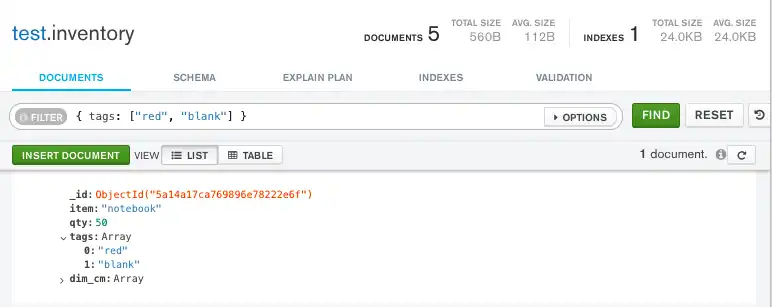
var filter = Builders<BsonDocument>.Filter.Eq("tags", new[] { "red", "blank" }); var result = collection.Find(filter).ToList();
cursor, err := coll.Find( context.TODO(), bson.D{{"tags", bson.A{"red", "blank"}}}, )
FindPublisher<Document> findPublisher = collection.find(eq("tags", asList("red", "blank")));
FindIterable<Document> findIterable = collection.find(eq("tags", asList("red", "blank")));
cursor = db.inventory.find({"tags": ["red", "blank"]})
const cursor = db.collection('inventory').find({ tags: ['red', 'blank'] });
$cursor = $db->coll("inventory")->find( { tags => [ "red", "blank" ] } );
$cursor = $db->inventory->find(['tags' => ['red', 'blank']]);
cursor = db.inventory.find({"tags": ["red", "blank"]})
client[:inventory].find(tags: ['red', 'blank'])
var findObservable = collection.find(equal("tags", Seq("red", "blank")))
If, instead, you wish to find an array that contains both the elements
"red" and "blank", without regard to order or other elements in
the array, use the $all operator:
db.inventory.find( { tags: { $all: ["red", "blank"] } } )
Copy the following filter into the Compass query bar and click Find:
{ tags: { $all: ["red", "blank"] } }
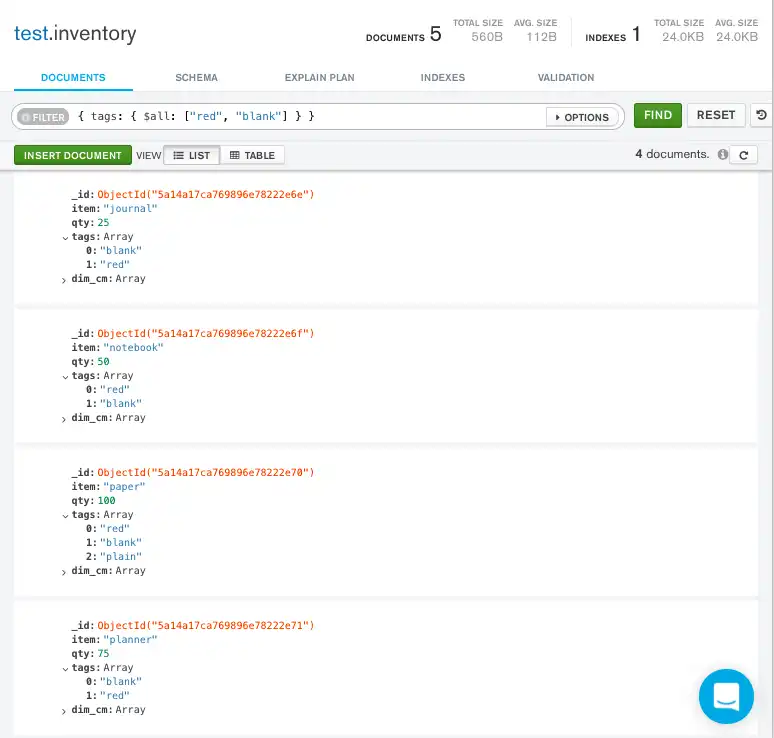
var filter = Builders<BsonDocument>.Filter.All("tags", new[] { "red", "blank" }); var result = collection.Find(filter).ToList();
cursor, err := coll.Find( context.TODO(), bson.D{ {"tags", bson.D{{"$all", bson.A{"red", "blank"}}}}, })
findPublisher = collection.find(all("tags", asList("red", "blank")));
findIterable = collection.find(all("tags", asList("red", "blank")));
cursor = db.inventory.find({"tags": {"$all": ["red", "blank"]}})
const cursor = db.collection('inventory').find({ tags: { $all: ['red', 'blank'] } });
$cursor = $db->coll("inventory")->find( { tags => { '$all' => [ "red", "blank" ] } } );
$cursor = $db->inventory->find(['tags' => ['$all' => ['red', 'blank']]]);
cursor = db.inventory.find({"tags": {"$all": ["red", "blank"]}})
client[:inventory].find(tags: { '$all' => ['red', 'blank'] })
findObservable = collection.find(all("tags", "red", "blank"))
Query an Array for an Element
To query if the array field contains at least one element
with the specified value, use the filter
{ <field>: <value> } where <value> is the element value.
To query if the array field contains at least one element with the specified value, construct a filter using the Eq method:
Builders<BsonDocument>.Filter.Eq(<field>, <value>)
<value> is the element value to match.
To query if the array field contains at least one element
with the specified value, use the filter
eq( <field>, <value>) where value is the element value.
To query if the array field contains at least one element
with the specified value, use the filter
eq( <field>, <value>) where <value> is the element value.
To query if the array field contains at least one element
with the specified value, use the filter
{ <field>: <value> } where <value> is the element value.
To query if the array field contains at least one element
with the specified value, use the filter
{ <field>: <value> } where <value> is the element value.
To query if the array field contains at least one element with the specified value, use the filter
{ <field> => <value> } where value is the element value.
To query if the array field contains at least one element
with the specified value, use the filter
[ <field> => <value> ] where <value> is the element value.
To query if the array field contains at least one element
with the specified value, use the filter
{ <field>: <value> } where <value> is the element value.
To query if the array field contains at least one element
with the specified value, use the filter
{ <field> => <value> } where <value> is the element value.
To query if the array field contains at least one element
with the specified value, use the filter
equal( <field>, <value> ) where <value> is the element value.
The following example queries for all documents where tags is an
array that contains the string "red" as one of its elements:
db.inventory.find( { tags: "red" } )
Copy the following filter into the Compass query bar and click Find:
{ tags: "red" }
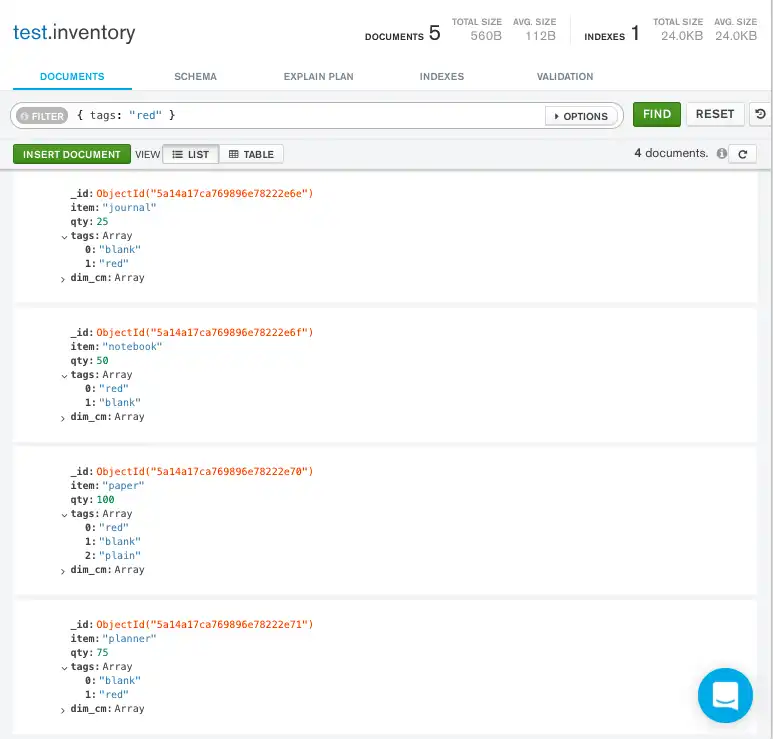
var filter = Builders<BsonDocument>.Filter.Eq("tags", "red"); var result = collection.Find(filter).ToList();
cursor, err := coll.Find( context.TODO(), bson.D{ {"tags", "red"}, })
findPublisher = collection.find(eq("tags", "red"));
findIterable = collection.find(eq("tags", "red"));
cursor = db.inventory.find({"tags": "red"})
const cursor = db.collection('inventory').find({ tags: 'red' });
$cursor = $db->coll("inventory")->find( { tags => "red" } );
$cursor = $db->inventory->find(['tags' => 'red']);
cursor = db.inventory.find({"tags": "red"})
client[:inventory].find(tags: 'red')
findObservable = collection.find(equal("tags", "red"))
To specify conditions on the elements in the array field, use query operators in the query filter document:
{ <array field>: { <operator1>: <value1>, ... } }
To specify conditions on the elements in the array field, use query operators in the query filter document:
{ <array field>: { <operator1>: <value1>, ... } }
To specify conditions on the elements in the array field, use query operators in the query filter document. For example:
var builder = Builders<BsonDocument>.Filter; builder.And(builder.Eq(<array field>, <value1>), builder.Lt(<array field>, <value2>));
To specify conditions on the elements in the array field, use query operators in the query filter document. For example:
and(gte(<array field>, <value1>), lt(<array field>, <value2>) ...)
To specify conditions on the elements in the array field, use query operators in the query filter document. For example:
and(gte(<array field>, <value1>), lt(<array field>, <value2>) ...)
To specify conditions on the elements in the array field, use query operators in the query filter document:
{ <array field>: { <operator1>: <value1>, ... } }
To specify conditions on the elements in the array field, use query operators in the query filter document:
{ <array field>: { <operator1>: <value1>, ... } }
To specify conditions on the elements in the array field, use query operators in the query filter document:
{ <array field> => { <operator1> => <value1>, ... } }
To specify conditions on the elements in the array field, use query operators in the query filter document:
[ <array field> => [ <operator1> => <value1>, ... ] ]
To specify conditions on the elements in the array field, use query operators in the query filter document:
{ <array field>: { <operator1>: <value1>, ... } }
To specify conditions on the elements in the array field, use query operators in the query filter document:
{ <array field> => { <operator1> => <value1>, ... } }
To specify conditions on the elements in the array field, use query operators in the query filter document:
and(gte(<array field>, <value1>), lt(<array field>, <value2>) ...)
For example, the following operation queries for all documents where the array
dim_cm contains at least one element whose value is greater than
25.
db.inventory.find( { dim_cm: { $gt: 25 } } )
Copy the following filter into the Compass query bar and click Find:
{ dim_cm: { $gt: 25 } }

var filter = Builders<BsonDocument>.Filter.Gt("dim_cm", 25); var result = collection.Find(filter).ToList();
cursor, err := coll.Find( context.TODO(), bson.D{ {"dim_cm", bson.D{ {"$gt", 25}, }}, })
findPublisher = collection.find(gt("dim_cm", 25));
findIterable = collection.find(gt("dim_cm", 25));
cursor = db.inventory.find({"dim_cm": {"$gt": 25}})
const cursor = db.collection('inventory').find({ dim_cm: { $gt: 25 } });
$cursor = $db->coll("inventory")->find( { "dim_cm" => { '$gt' => 25 } } );
$cursor = $db->inventory->find(['dim_cm' => ['$gt' => 25]]);
cursor = db.inventory.find({"dim_cm": {"$gt": 25}})
client[:inventory].find(dim_cm: { '$gt' => 25 })
findObservable = collection.find(gt("dim_cm", 25))
Specify Multiple Conditions for Array Elements
When specifying compound conditions on array elements, you can specify the query such that either a single array element meets these condition or any combination of array elements meets the conditions.
Query an Array with Compound Filter Conditions on the Array Elements
The following example queries for documents where the dim_cm array
contains elements that in some combination satisfy the query
conditions; e.g., one element can satisfy the greater than 15
condition and another element can satisfy the less than 20
condition, or a single element can satisfy both:
db.inventory.find( { dim_cm: { $gt: 15, $lt: 20 } } )
Copy the following filter into the Compass query bar and click Find:
{ dim_cm: { $gt: 15, $lt: 20 } }
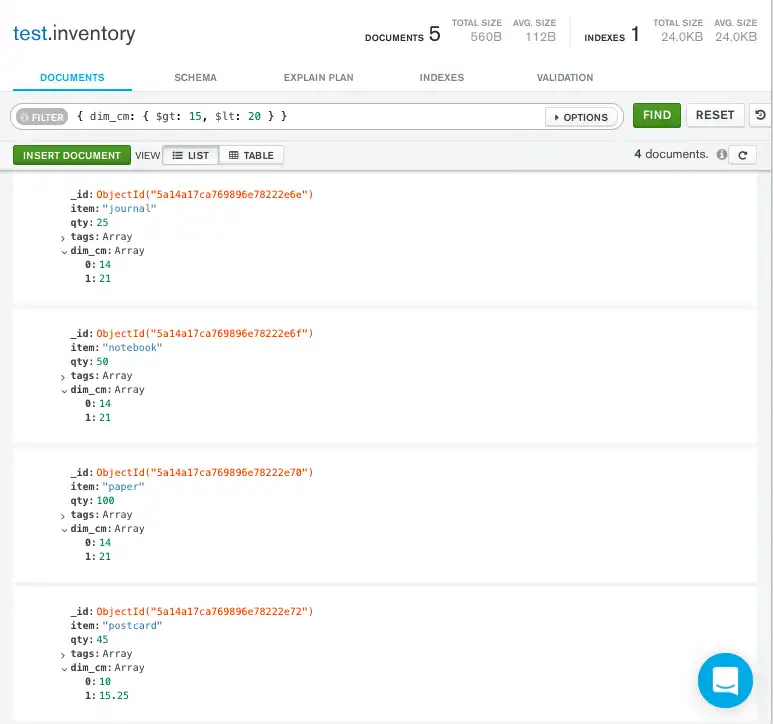
var builder = Builders<BsonDocument>.Filter; var filter = builder.And(builder.Gt("dim_cm", 15), builder.Lt("dim_cm", 20)); var result = collection.Find(filter).ToList();
cursor, err := coll.Find( context.TODO(), bson.D{ {"dim_cm", bson.D{ {"$gt", 15}, {"$lt", 20}, }}, })
findPublisher = collection.find(and(gt("dim_cm", 15), lt("dim_cm", 20)));
findIterable = collection.find(and(gt("dim_cm", 15), lt("dim_cm", 20)));
cursor = db.inventory.find({"dim_cm": {"$gt": 15, "$lt": 20}})
const cursor = db.collection('inventory').find({ dim_cm: { $gt: 15, $lt: 20 } });
$cursor = $db->coll("inventory")->find( { "dim_cm" => { '$gt' => 15, '$lt' => 20 } } );
$cursor = $db->inventory->find([ 'dim_cm' => [ '$gt' => 15, '$lt' => 20, ], ]);
cursor = db.inventory.find({"dim_cm": {"$gt": 15, "$lt": 20}})
client[:inventory].find(dim_cm: { '$gt' => 15, '$lt' => 20 })
findObservable = collection.find(and(gt("dim_cm", 15), lt("dim_cm", 20)))
Query for an Array Element that Meets Multiple Criteria
Use $elemMatch operator to specify multiple criteria on the
elements of an array such that at least one array element satisfies all
the specified criteria.
The following example queries for documents where the dim_cm array
contains at least one element that is both greater than ($gt)
22 and less than ($lt) 30:
db.inventory.find( { dim_cm: { $elemMatch: { $gt: 22, $lt: 30 } } } )
Copy the following filter into the Compass query bar and click Find:
{ dim_cm: { $elemMatch: { $gt: 22, $lt: 30 } } }
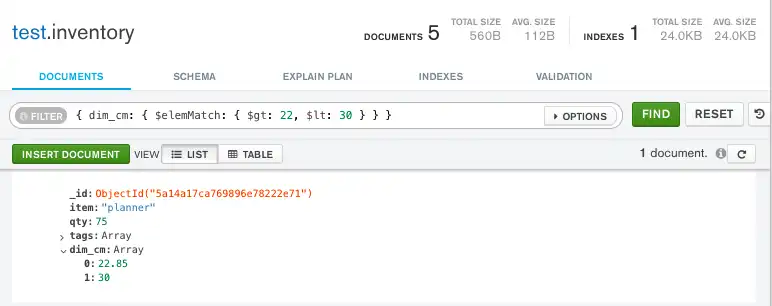
var filter = Builders<BsonDocument>.Filter.ElemMatch<BsonValue>("dim_cm", new BsonDocument { { "$gt", 22 }, { "$lt", 30 } }); var result = collection.Find(filter).ToList();
cursor, err := coll.Find( context.TODO(), bson.D{ {"dim_cm", bson.D{ {"$elemMatch", bson.D{ {"$gt", 22}, {"$lt", 30}, }}, }}, })
findPublisher = collection.find(elemMatch("dim_cm", Document.parse("{ $gt: 22, $lt: 30 }")));
findIterable = collection.find(elemMatch("dim_cm", Document.parse("{ $gt: 22, $lt: 30 }")));
cursor = db.inventory.find({"dim_cm": {"$elemMatch": {"$gt": 22, "$lt": 30}}})
const cursor = db.collection('inventory').find({ dim_cm: { $elemMatch: { $gt: 22, $lt: 30 } } });
$cursor = $db->coll("inventory")->find( { dim_cm => { '$elemMatch' => { '$gt' => 22, '$lt' => 30 } } } );
$cursor = $db->inventory->find([ 'dim_cm' => [ '$elemMatch' => [ '$gt' => 22, '$lt' => 30, ], ], ]);
cursor = db.inventory.find({"dim_cm": {"$elemMatch": {"$gt": 22, "$lt": 30}}})
client[:inventory].find(dim_cm: { '$elemMatch' => { '$gt' => 22, '$lt' => 30 } })
findObservable = collection.find(elemMatch("dim_cm", Document("$gt" -> 22, "$lt" -> 30)))
Query for an Element by the Array Index Position
Using dot notation, you can specify query conditions for an element at a particular index or position of the array. The array uses zero-based indexing.
Note
When querying using dot notation, the field and nested field must be inside quotation marks.
The following example queries for all documents where the second
element in the array dim_cm is greater than 25:
db.inventory.find( { "dim_cm.1": { $gt: 25 } } )
Copy the following filter into the Compass query bar and click Find:
{ "dim_cm.1": { $gt: 25 } }
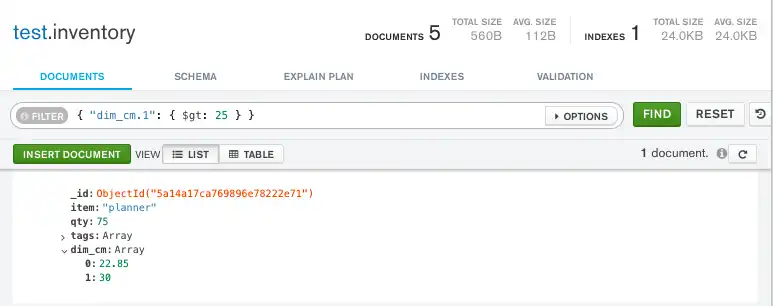
var filter = Builders<BsonDocument>.Filter.Gt("dim_cm.1", 25); var result = collection.Find(filter).ToList();
cursor, err := coll.Find( context.TODO(), bson.D{ {"dim_cm.1", bson.D{ {"$gt", 25}, }}, })
findPublisher = collection.find(elemMatch("dim_cm", Document.parse("{ $gt: 22, $lt: 30 }")));
findIterable = collection.find(gt("dim_cm.1", 25));
cursor = db.inventory.find({"dim_cm.1": {"$gt": 25}})
const cursor = db.collection('inventory').find({ 'dim_cm.1': { $gt: 25 } });
$cursor = $db->coll("inventory")->find( { "dim_cm.1" => { '$gt' => 25 } } );
$cursor = $db->inventory->find(['dim_cm.1' => ['$gt' => 25]]);
cursor = db.inventory.find({"dim_cm.1": {"$gt": 25}})
client[:inventory].find('dim_cm.1' => { '$gt' => 25 })
findObservable = collection.find(gt("dim_cm.1", 25))
Query an Array by Array Length
Use the $size operator to query for arrays by number of
elements. For example, the following selects documents where the array
tags has 3 elements.
db.inventory.find( { "tags": { $size: 3 } } )
Copy the following filter into the Compass query bar and click Find:
{ "tags": { $size: 3 } }

var filter = Builders<BsonDocument>.Filter.Size("tags", 3); var result = collection.Find(filter).ToList();
cursor, err := coll.Find( context.TODO(), bson.D{ {"tags", bson.D{ {"$size", 3}, }}, })
findPublisher = collection.find(size("tags", 3));
findIterable = collection.find(size("tags", 3));
cursor = db.inventory.find({"tags": {"$size": 3}})
const cursor = db.collection('inventory').find({ tags: { $size: 3 } });
$cursor = $db->coll("inventory")->find( { tags => { '$size' => 3 } } );
$cursor = $db->inventory->find(['tags' => ['$size' => 3]]);
cursor = db.inventory.find({"tags": {"$size": 3}})
client[:inventory].find(tags: { '$size' => 3 })
findObservable = collection.find(size("tags", 3))
Query an Array with MongoDB Atlas
The example in this section uses the sample movies dataset. To learn how to load the sample dataset into your MongoDB Atlas deployment, see Load Sample Data.
To query an array in MongoDB Atlas, follow these steps:
Specify a query filter document.
To query a document that contains an array,
specify a query filter document.
A query filter document uses query operators to specify search conditions.
Use the following example documents to query array fields in the
sample_mflix.movies collection.
To apply a query filter, copy an example document into the Filter search bar and click Apply.
To specify an equality condition on an array, use the query
document { <field>: <value> } where <value> is
the exact array to match, including the order of the elements.
The following example finds documents that have a genres
field that contains the ["Action", "Comedy"] array in the
specified order:
{ genres: ["Action", "Comedy"] }
To find an array that contains both the elements Action and
Comedy, without regard to order or other elements
in the array, use the $all operator:
{ genres: { $all: ["Action", "Comedy"] } }
To query if the array field contains at least one element with the
specified value, use the filter { <field>: <value> } where
<value> is the element value.
The following example queries for all documents where the
genres field contains the string Short as one
of its elements:
{ genres: "Short" }
To specify conditions on the elements in the array field, use query operators in the query filter document:
{ <array field>: { <operator1>: <value1>, ... } }
For example, the following operation uses the
$nin operator to query for all documents
where the genres field does not contain Drama.
{ genres: { $nin: ["Drama"] } }
When specifying compound conditions on array elements, you can specify the query such that either a single array element meets these condition or any combination of array elements meets the conditions.
Query an Array with Compound Filter Conditions on the Array Elements
The following example queries for documents where the cast
array contains elements that in some combination satisfy the query
conditions. For example, the following filter uses the $regex
and $eq operators to return documents where a single array element
ends in Olsen and another element equals Mary-Kate Olsen or
a single element that satisfies both conditions:
{ cast: { $regex: "Olsen$", $eq: "Mary-Kate Olsen" } }
This query filter returns movies that include Mary-Kate Olsen in
their cast, and movies that include both Mary-Kate Olsen and
Ashley Olsen in their cast.
Query for an Array Element that Meets Multiple Criteria
Use $elemMatch operator to specify multiple criteria on the
elements of an array such that at least one array element satisfies all
the specified criteria.
The following example uses the $elemMatch and $ne
operators to query for documents where the languages array contains
at least one element that is both not null and does not equal English.
{ languages: { $elemMatch: { $ne: null, $ne: "English" } } }
Query for an Element by the Array Index Position
Using dot notation, you can specify query conditions for an element at a particular index or position of the array. The array uses zero-based indexing.
Note
When querying using dot notation, the field and nested field must be inside quotation marks.
The following example uses the $ne operator to query
for all documents where the first element in the countries
array is not equal to USA:
{ "countries.0": { $ne: "USA" }
Query an Array by Array Length
Use the $size operator to query for arrays by number of
elements. For example, the following selects documents where the array
genres has 3 elements.
{ genres: { $size: 3 } }
Additional Query Tutorials
For additional query examples, see: